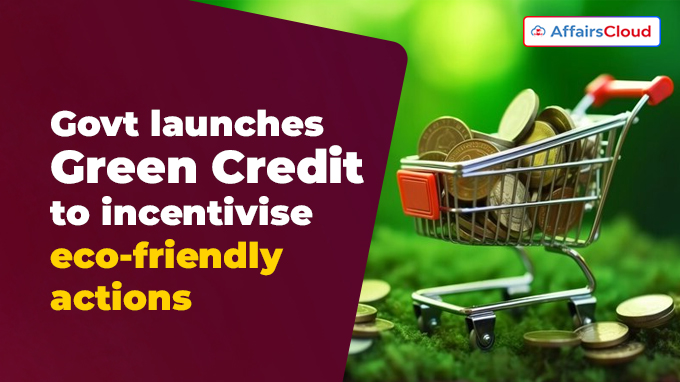 The Ministry of Environment, Forest and Climate Change (MoEF&CC) launched 2 new initiatives, Green Credit Program (GCP) and the Ecomark Scheme to encourage sustainable practices rooted in tradition and conservation and promote the ideas of ‘LiFE’ – ‘Lifestyle for Environment’ movement.
The Ministry of Environment, Forest and Climate Change (MoEF&CC) launched 2 new initiatives, Green Credit Program (GCP) and the Ecomark Scheme to encourage sustainable practices rooted in tradition and conservation and promote the ideas of ‘LiFE’ – ‘Lifestyle for Environment’ movement.
- These 2 initiatives includes India’s pro-active approach of climate change, sustainability and promotion of eco-conscious practices.
About Green Credit Program (GCP): Incentivizing Environmental Actions
Green Credit Program (GCP) was notified on 12th October 2023. It is an innovative market-based mechanism designed to incentivize voluntary environmental actions across diverse sectors, by various stakeholders.
- GCP is independent of the carbon credit provided under the Carbon Credit Trading Scheme, 2023 under the Energy Conservation Act, 2001.
- The MoEF&CC have made a set of rules called “Green Credit Rules, 2023” in exercise of the powers conferred by section 3, section 6 and section 25 of the Environment (Protection) Act, 1986 (29 of 1986).
Objectives of GCP:
- To promote positive actions through market based mechanism and generate green credit. These credits are tradable and can be made available for trading on a domestic market platform.
- The green credit will arise from taking measures by a person of any environment activities referred to in sub-rule (2) of rule 4.
- This will encourage the industries to meet the obligations under any law and to undertake voluntary environmental measures referred to in rule 4 by generating or buying green credit.
Administrator:
Dehradun, Uttarakhand-based Indian Council of Forestry Research and Education (ICFRE), a Society registered under the Societies Registration Act, 1860, is the administrator of the Green Credit Rule 2023.
- The administrator will be responsible for program implementation, management, monitoring, and operation.
Inter-ministerial Steering Committee:
The Steering Committee constituted by the Central Government will be responsible for the monitoring of the implementation of the GCP.
- It will comprise of representatives from the Ministries or Departments, experts from the field of environment, industry associations and other relevant stakeholders.
Technical Committee:
Technical Committee constituted by the Central Government, based on the recommendations of the Administrator, for each activity to assist the Administrator in implementation of GCP.
Key Points:
i.The ICFRE along with experts will establish or develop
- Green Credit Registry- for the registration and issuance of each Green Credit.
- Trading platform – which will perform functions regarding the trading of green credit, in accordance with the guidelines made by the Administrator and
- · Knowledge and data platform – for providing transparency on various activities being undertaken and for reporting sectoral progress under these rules
ii.The activities of the Administrator, designated agency, Registry, trading platform and knowledge and data platform will be audited within a period of one year at the end of every third financial year by independent auditors to be appointed by the Central Government on the recommendation of the Steering Committee.
Green Credits:
i.In its initial phase, the GCP focuses on two key activities: water conservation and afforestation.
- Overall, it will cover 8 types of activities viz. tree plantation, water management, sustainable agriculture, waste management, air pollution reduction, and mangrove conservation and restoration.
ii.To earn Green Credits, one needs to register the activity at app/website www.moefcc-gcp.in. The Administrator will verify it, using designated agencies or self-verification for small projects. After verification, Green Credit certificate will be granted.
iii.The calculation of Green Credit will be based on equivalence of resource requirement, parity of scale, scope, size, and other relevant parameters to achieve the desired environmental outcome
- Draft methodologies are being prepared for awarding Green Credits which will be notified for stakeholder consultation.
About Ecomark Scheme: Promoting Eco-Friendly Products
Ecomark Scheme notified on 11th October 2023 succeed the previous rules notified in 1991. It provides accreditation and labelling for household and consumer products that meet specific environmental criteria while maintaining quality standards as per Indian norms
- MoEF&CC in exercise of the powers conferred by sub-section (1), clause (ii) of sub-section 2 of section 3, sub-section (1) of section 6, and sub-section (1) of section 25 of the Environment (Protection) Act, 1986 notified Ecomark Certification Rules, 2023 for labeling of environment friendly products.
What is Ecomark Scheme?
The scheme under the Ecomark Certification Rules, 2023, enables labelling of products with minimal environmental impact, and encouraging consumers and manufacturers to choose eco-friendly options. These rules ensure products meet environmental standards, focusing on factors like climate change impact, energy use, waste generation, pollution, and hazardous substances.
- This means Products with the ECO Logo and ISI (Indian Standards Institution) Mark meet specific environmental and quality criteria set by Indian Standards.
Objectives:
i.To support the principles of LiFE.
ii.To promote resource efficiency & circular economy
iii.To prevent misleading information on environmental aspects of products
Key Points:
i.The Central Pollution Control Board (CPCB) administers the Ecomark Scheme in partnership with Bureau of Indian Standards (BIS), which is the national body for standards and certification.
ii.The rules will be administered by the MoEF&CC while the governance of the Ecomark Rules for its effective implementation will be done by the Steering Committee.
iii.The State Pollution Control Board (SPCB)/ Pollution Control Committee (PCC) shall create awareness about the Ecomark Rules.
India Announces Definition of Green Hydrogen
The Ministry of New and Renewable Energy (MNRE) notified the Green Hydrogen Standard for India which sets emission limits for hydrogen production to be considered ‘Green,’ indicating it comes from renewable sources.
- As per this, Green Hydrogen is now defined as ‘having a well-to-gate emission (i.e., including water treatment, electrolysis, gas purification, drying and compression of hydrogen) of not more than 2 kg CO2 equivalent / kg H2.’
- The scope of the definition encompasses both electrolysis-based and biomass-based hydrogen production methods.
Key Points:
i.With this notification, India becomes one of the first few countries in the world to announce a definition of Green Hydrogen.
ii.The Bureau of Energy Efficiency (BEE), Ministry of Power will be the Nodal Authority for accreditation of agencies for the monitoring, verification and certification for Green Hydrogen production projects.
Click Here for Official Notification
Recent Related News:
i.Justice Sheo Kumar Singh-I was appointed as the acting chairperson of National Green Tribunal (NGT) by the Union Ministry of Environment, Forest and Climate Change (MoEFCC) with the effect from July 6, 2023 until further notice. He succeeded Justice Adarsh Kumar Goel.
ii.On 20th July 2023, NITI Aayog in collaboration with energy and climate think-tank Vasudha Foundation released the India Climate Energy Dashboard (ICED) 3.0 during the 14th Clean Energy Ministerial (CEM) in Goa. The ICED is the country’s one-stop platform for revamped online data center on energy, electric mobility, climate and related economic datasets.
About Bureau of Indian Standards (BIS):
Director General– Pramod Kumar Tiwari
Headquarters– New Delhi, Delhi
Establishment– April 1, 1987




